Are Microwave Meals Bad for You?
Microwave meals have become a popular choice for their convenience and time-saving qualities. However, concerns have been raised about their impact on health. In this blog post, we will share and discuss the factors that contribute to their overall nutritional value and potential health implications.
Microwave meals and nutrition
Microwave meals vary in their nutritional content. Some are well-balanced, including proteins, carbohydrates, and vegetables, while others may be higher in sodium, unhealthy fats, or artificial additives. It’s important to read labels and choose microwave meals with adequate nutrients and fewer additives for better overall nutrition.
Processing and preservatives
Many microwave meals undergo processing and may contain preservatives to prolong shelf life. While these measures ensure food safety, it’s worth considering the types and amounts of preservatives used. Opting for microwave meals with fewer additives and preservatives can help reduce potential risks associated with excessive consumption.
Microwaving and nutrient retention
Microwaving as a cooking method can affect the nutrient content of food, similar to other cooking techniques. However, the extent of nutrient loss depends on factors such as cooking time, temperature, and the specific food being heated. While some vitamins and minerals may be slightly reduced during microwaving, it is generally a gentler cooking method compared to boiling or frying. Choosing microwave meals that prioritise nutrient retention during preparation can help preserve their nutritional value.
Overall dietary patterns
The impact of microwave meals on health should be considered within the context of an individual’s overall dietary patterns. While microwave meals can provide convenience, relying solely on them for daily meals may lead to an imbalanced diet. It’s important to incorporate a variety of fresh, whole foods alongside microwave meals to ensure a well-rounded and nutritious diet.
In conclusion, whether microwave meals are bad for you depends on various factors. Choosing microwave meals with balanced nutrients, fewer additives, and moderate sodium content can contribute to a healthier option. Incorporating whole foods and maintaining a varied diet alongside microwave meals is crucial for overall nutrition. Remember to make informed choices, read labels, and prioritise a balanced diet for better long-term health.

